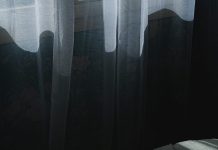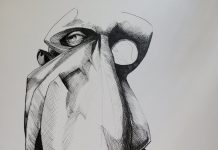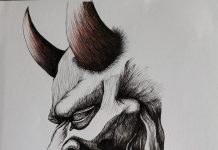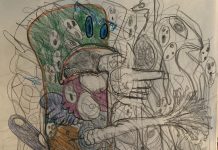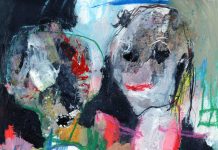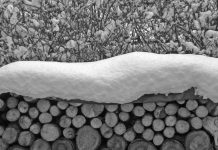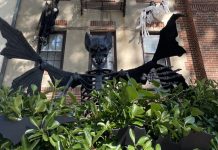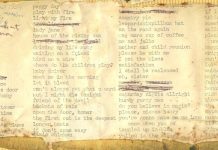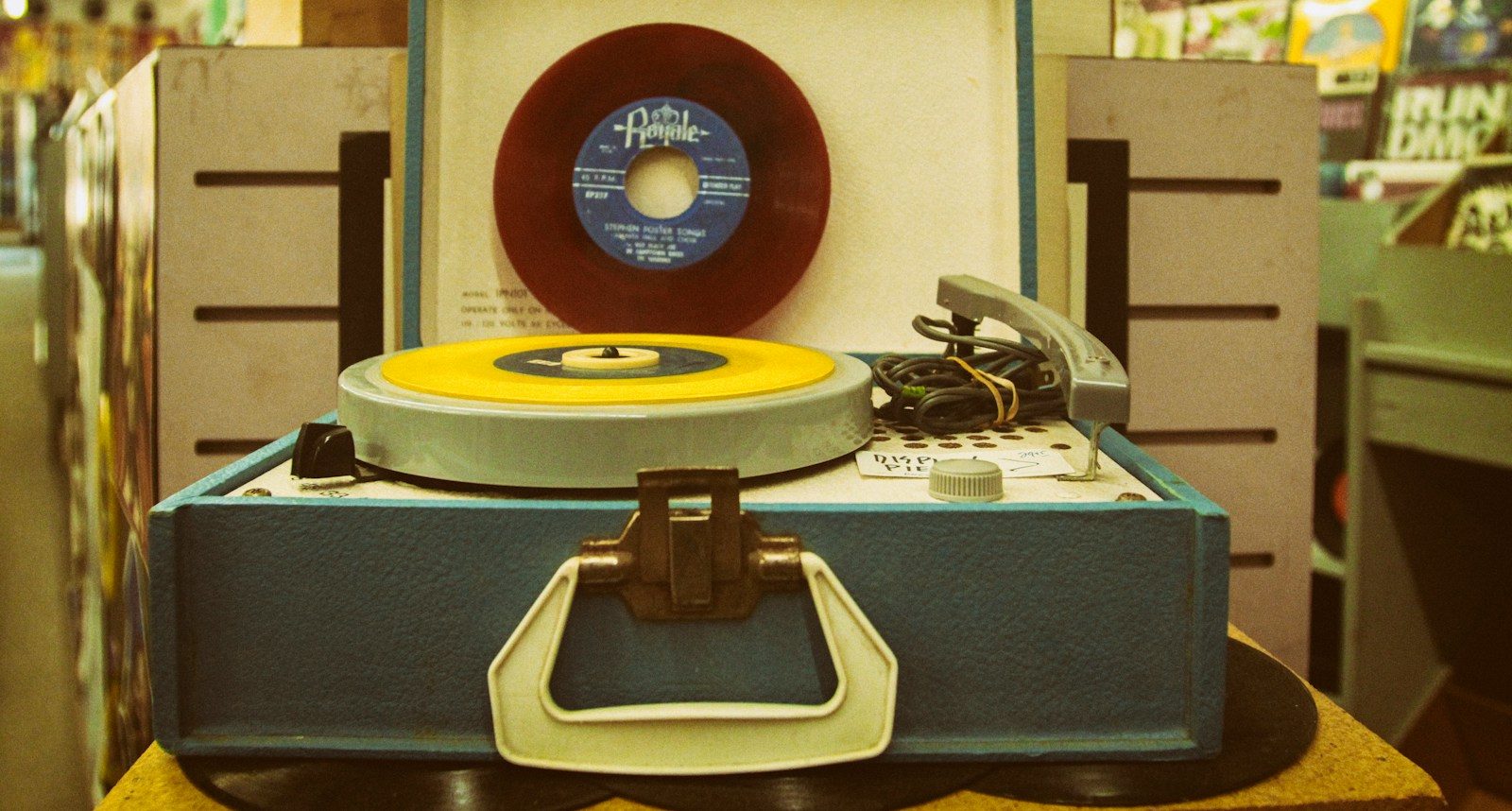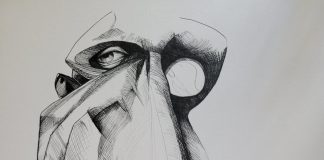Forty-Fives
A Story in Interconnected Flash
-1-
Ada’s skin was caramel and her hair so black it looked blue. She was tiny with shoulder blades like wire hangers, and bony legs that got goose bumps whenever she went outside.
Ada was a new girl who came in the middle of the school year. She sat next to me in fifth grade. Sometimes a kid named Jeffrey asked if I was babysitting. I told him no.
“That’s good,” he said. “You shouldn’t hang around with her anyway. She doesn’t belong here.”
Ada tapped my forearm. She held her finger to her pale, cracked lips.
“Stay quiet,” she whispered. “I do that with my dad and brother.”
Her little brother Sam was two grades behind us and even smaller, his body compact but strong, his dark hair oiled and carefully combed. He wore pressed pants, button-down shirts, and a gold-plated watch with a sleek leather band. His skin was more amber than Ada’s, his eyes just as glossy. His long lashes descended like curtains when he blinked and cast shadows on his cheeks.
Ada and Sam had moved into the stretched-out ranch down the block. We all rode the same bus to Edison Elementary. Ada’s mom wanted her to sit with Sam, but said it was OK if she didn’t, as long as she sat with me.
“Dad says Sam can watch me from anywhere,” Ada said.
Sam slid in behind us. He tapped his foot on the back of our seat.
“Remember what Dad said about Diane.” Sam pulled the tips of Ada’s hair. “He told me to tell if you talked to her again.”
Ada swung her legs. The toes of her flat black shoes grazed the floor. I asked why her dad would say that.
“Ada knows why.” Sam gripped the seat and leaned over, sticking his face between us. “Diane’s one of those people.”
Ada’s body shook. Her lunch bag fell off her lap, then slid beneath the seat as the bus took a curve. She reached to get it, but Sam was quick, scooting down to grab it.
“Now look what you did.” He sneered and held up a dirty, crinkled bag. “Your food is fit for a dog now.”
Sam tossed Ada’s lunch back over the seat. She slipped it inside her jacket and pressed it to her belly.
“You should give that to Diane,” Sam said. “She’s a dog. I’ve seen her eating dirt.”
Ada stared and fiddled with her narrow glasses. She bounced and fell against me when the bus went over a bump.
“Oh. Sorry.” Her voice squeaked. “Really. I’m sorry.”
Sam swatted Ada with a book. She covered her head and hunched. I told him to stop.
“Mind your own business,” he said.
Sam looked at himself in the smeared bus window. He pounded his knees then cracked his knuckles. Turning sideways, he took up the whole seat so no one could sit next to him, a grin breaking across his face.
The white ranch with dark windows was kitty-corner to my house. Ada had moved there in November with her mom and little brother Sam. Her dad had lived there since April, moving in potted palms, ornately framed pictures of sienna landscapes, and etched brass vases adorned with red.
Sometimes, a man with oily black hair and a tawny complexion like her dad helped him move things in a windowless van. They’d unload and haul in carved headboards, dressers with glass knobs, thick tables and chairs, and rolled up rugs. Afterward, they’d sit on the stoop to smoke unfiltered cigarettes and drink coffee from tiny ceramic cups, their sleeves rolled up on their oxford shirts, their knit brown pants bunched in the tongues of their tied leather shoes.
The man helped Ada’s dad moved Ada, her Mom, and little brother into the house. They drove up at dusk in a sleek silver sedan, and he escorted them, walking behind them as they carried leather suitcases and wore high-collared coats and checked scarfs. The man came back and forth for a few weeks, bringing food in paper sacks, and helping Ada’s dad cut grass and rake. He left and never came back. Ada and Sam started school a few weeks later.
Ada missed a lot of fifth grade. She was frail and quiet and told me her dad her dad wouldn’t let her go out or go to school when she got what her mom got every month.
“My dad says I need to stay home,” she said. “Until I’m better.”
The teacher asked if I could take reading assignments and math problems to Ada so she wouldn’t fall behind.
“I tell her dad she’s really smart and does well in school,” she said. “I tell Ada that, too.”
I got off the bus and walked a block to Ada’s house, carrying her homework in a manila envelope. I took the swept walk to the porch, and rang the doorbell. Ada’s little brother opened the door. He stood and stared, his feet aligned in the diamond-patterns of a red wool rug.
“Ada’s sick,” he said. “She can’t see anyone. My dad said so.”
I held out her homework, saying the teacher asked me to drop it off.
“I hope she gets better,” I said. “Say hi to her for me.”
Sam snatched the envelope. He slapped it against his thigh.
“You have to go now,” he said.
I heard a soft voice floating from behind him. Standing on my tiptoes, I saw a woman in a wash of dim light, her form a ripple of silk scarves and robes, her smile translucent, her eyes deeply gentle, as she slowly closed the door.
Ada didn’t talk much when she came back to school after being sick for a week. She looked skinny and her face was tight. White flakes peppered her dull black hair.
She kept her eyes fixed on the top of her shoes as we walked down the hall. When our friend Diane passed us and said she’d see us at lunch, Ada looked away and bent down to pull up her knee socks.
We squeezed between kids who elbowed and taunted and pushed their way into the hot lunch line. Me and Ada escaped to a table with our packed lunches and sat a few seats away from girls saving places for their blonde friends.
I looked for Diane but didn’t see her. Instead, I saw Sam, Ada’s little brother, staring us down from two tables away, arranging his lunch atop a red cloth napkin trimmed with gold and silver threads.
“Do you see Diane?” I looked at Ada. Her eyes wandered. She pushed up her crooked glasses.
“No,” she said. “I mean, my dad. He says I can’t hang out with her, that she’s from people who hurt us.”
I asked her what she meant. She looked at Sam, then covered her mouth, pretending to cough.
“My mom,” she said. “She says it’s OK. That Diane’s just a girl. But Sam. He and Dad say it’s not. That girls grow up.”
Ada opened her sack lunch and pulled out dried fruit, flat bread, and pale juice. She stretched the bread until it tore in two.
“Is that all you got?” I finished my peanut butter sandwich, then ate Fritos.
Ada lifted the bread to her lips. Her fingernails were ragged, her forearms crisscrossed with angry red scratches.
“What happened?” I unwrapped a Ho-Ho. She tugged at her shirt-sleeves.
“It’s nothing,” she said. “Sam and me. We were just playing.”
Ada stuffed her half-eaten lunch back in the bag.
“Hey Ada.” Diane slid next to me. She shook a carton of milk and took a long drink.
“I gotta go.” Ada stood up and gathered her things. Scurrying away, she almost slipped on the waxy floor.
“That’s weird,” I said.
Diane fiddled with a star pendant dangling over her collar.
“I guess,” she said. “It’s her brother. You know. Over there.”
Diane tipped her head at Sam. She rolled up her empty lunch bag and twisted it.
“He really hates me.”
I shrugged, saying he probably hated every girl.
“I don’t think so,” Diane said. “My mom says he hates me because his dad taught him to.”
Sometimes after school, I did my homework, watched Dark Shadows, and wandered down to Ada’s house to see if her Mom would let her go to Kmart so we could buy 45s and get fries and Cokes at their in-store grill.
Ada’s house was silent, the windows closed even on hot days. Patches of dry dirt spotted the cut lawn. Shallow trenches lined either side of the concrete walk, while black tarps covered flower beds, held in place with smooth flat stones.
I knocked on the door. No one answered. I knocked again. Sparrows rustled inside a yew bush, then escaped to flutter into the whirled gray sky.
The hinges squeaked. A deep tawny eye peered through the crack. I asked if Ada could come out.
“Ada’s in her room.” The crack grew wider. Ada’s mom was there, her body shrouded by the door. I asked again. Her mom shook her head. A breeze rattled a tree branch. I turned to walk away.
“No. Wait.” Ada’s mom clapped. Her voice rose, her words accented and smooth. “Please. Come in.”
The door drifted open. Her face vanished. I stepped into a dim foyer. A striped flag with a red triangle was tacked to the wall next to a map of a skinny country. A portrait of a man with a salt-and-pepper beard was on the opposite wall. He was smiling, looking sideways, his hair covered by a checked black-and-white scarf that draped like a ponytail.
“Here. In here.”
I passed through louvered doors and onto a mosaic floor. Ada’s Mom was at the stove, stirring a giant pot. Steam blanketed her silken bathrobe, and dissolved into her velvety hair. She raised the spoon to her heart-shaped lips and took a sip.
“It’s good now.” She set the spoon on the cupboard next to rows of flat wet leaves. She turned and leaned, her eyes level with mine. Her bathrobe fell open, her curves encased in a heavy wired bra and thick satin underwear that cut into her waist.
“Such pretty colored hair,” she said. “And your eyes, too.”
Ada’s mom straightened. She cinched her robe. A smile free of lines or shadows formed on her face.
“Ada’s room,” she said. “It’s right down the hall.”
The tips of her cool delicate fingers lingered on my cheek.
“Go play,” she said. “Be little girls. Her dad and brother will be home soon.”
A box-shaped hat trimmed with gold satin rested on a table across from Ada’s room. Colorful strings dangled from the back, and coins were sewn into the red and black weave. A framed picture of Ada’s grandma was on the table, too, her eyes deep caves, her mouth a wrinkle. She was wearing the hat, her dress a canvas of flowers and diamonds, a multi-colored cross-stitch of diagonals and rows.
I stepped into Ada’s room and sat in a carved teak chair. The walls were stark white
and a line of sunlight leaked beneath the tapestry of green and gold drapes. Ada sat cross-legged in the middle of her bed, still dressed in the pleated brown skirt and high-button blouse she had worn to school.
I asked if her mom would let us go to Kmart, if she would give us a dollar or two to buy some new 45s, maybe something by CCR, or Tom Jones, or a song about war we’d heard on her plastic radio when we tuned it to 1040-AM.
Ada shook her head.
“Probably not,” she said. “Mom and me. We can’t go out when Dad’s gone.”
Ada began sorting through her 45s, curating a small stack. She put an Elvis record first, then one by Marvin Gaye, followed by Patches, a Top 40 hit by Clarence Carter, that we’d bought last week.
“Mom says we can play these if we want,” she said. “Only we have to go to the basement, do it before my dad gets home.”
Ada slipped the records in a satchel. She slid off the bed and pulled a small red-and-white case from the closet.
“Here,” she said. “Help me with the record player.”
Ada checked the locks, and fiddled with the handle. She passed me the player.
“Hold it flat,” she said. “So it doesn’t open.”
I cradled the record player as I looked at a wall calendar hanging from a thin wire. Curved letters and dots were printed along the bottom of a black-and-white picture of a blown-up street, the buildings crumbled in a smoldering rubble of stone and jutting metal. A dark plume of smoke rose from a twisted car, while a woman coated in dust held a limp child in tattered clothes. More children were collapsed at her feet, their eyes wounds, their hair oozing with blood.
“That’s our homeland,” Ada said. “My dad wants me to remember, even though I was so little when we left.”
Ada’s mom reached for something in the cupboard, her silken bathrobe parted over her sculpted legs. Steam curled past me, obscuring the picture of a bearded man, his head wrapped in a checked black-and-white scarf.
“You girls going downstairs?” She dabbed sweat from her breastbone. “Please. Take these.”
Ada’s mom padded across the mosaic tiles in her bare feet. She handed me a bag filled with diamond pastries made with green nuts and topped with sticky syrup. I said thank you. She touched my shoulder, smiled, and blinked slowly, like a cat.
“You girls go play now,” she said. “Before Ada’s dad and brother get home.”
Ada hiked up the satchel she’d stuffed with 45s. I carried the portable record player,
all latched up like a suitcase. We scrambled down the rickety steps.
“Let’s go to the back room.” Ada led me to a steel door recessed in the plastered wall. She took a breath, grabbed the handle, and pulled, the door scraping on the linoleum.
“There.” Ada slipped through and yanked a chain dangling from the ceiling. Harsh light from an uncovered bulb filled the room, and glared on a flag with a red triangle cutting in to black, green, and white stripes. A set of four single beds on metal frames stuck-out from the far wall. Two folding chairs faced a long pine table with large metal radios. Tall steel shelves rose along the opposite walls, stocked with cans, jars, water jugs, and powdered milk.
“I know. It’s strange.” Ada sat down and spread the 45s in an arc.
“Who sleeps down here?” I put the record player down and sat next to Ada, the cement floor cold on the back of my legs.
“Nobody yet,” Ada said. “My dad says we all might someday depending on what happens.”
Ada unsnapped the clips on the record player and turned it on. The speaker buzzed.
“Do you like this one?” Ada put In the Ghetto on the platter and lowered the needle. “It’s by Elvis.”
Ada cleared her throat. She began to hum, then to sing along, sitting cross-legged,
flexing her fingers, her eyelids fluttering as the stylus popped and bounced at the end of the 45.
“Do you want to hear it again?” Ada moved the stylus back to the start of the spinning record. “Just one more time, OK?”
We played a few more Top 40 records in the shelter then packed up.
“I think we might have time.” Ada pushed the steel door shut with her hip and shoulder. “My mom said we could go to Kmart if we hurried.”
We tiptoed upstairs and slid the record player and 45s beneath Ada’s bed.
“Go on.” Ada rummaged for coins in her dresser. “I’ll meet you outside.”
I darted from Ada’s room and into the hall by the kitchen.
“Are you two leaving?” Ada’s Mom looked up from tossing leafy spices into a pot. I said we were and inched out the front, closing the door so the latch wouldn’t click. Ada and her mom talked on the other side of the door, their words a melodic cadence I couldn’t understand.
Ada slipped out. She pulled up her cabled knee socks, and buttoned a heavy black sweater. Her hand was clenched, and when she relaxed, a few quarters dropped and rolled across the sidewalk.
“My mom gave us money for 45s.” She scrambled for the coins. “I just have to be back soon.”
We ran across the lawn toward the gravel shoulder. Ada passed me, and I called after her to wait. She kept running until she collapsed. I asked if she was OK. She spoke between breaths.
“I’m fine.” Ada peeled off her sweater and tied it like a cape over her bony shoulders. “I’m just too hot.”
Ada rose and wobbled. Her shoe fell off, and she carried it. She winced when she stepped on a pebble. Putting her shoe back on, she stomped, driving her toe to the end.
“There’s the road,” she said. “Come on.”
A traffic light turned green, and a band of station wagons went through. Beeps and bells and the clatter of shopping carts drifted over the rumble of cars. Standing by the road, I saw the giant K beyond the switch grass, and the rectangular stretch of the store.
“Ada. Get back here.” The screams of her little brother rose a few yards behind us as he pedaled furiously on his banana bike. “Dad’s mad. You better get home.”
Ada ran faster. Her shoes fell off, but she kept going, the bottom of her white socks turning black. Sam sped by me.
“Ada. Goddammit Ada.”
Ada weaved in a crooked line. The Kmart was there, the gate opened on the tall red fence surrounding the side entrance.
“Don’t cross, you dumb dog.” Sam let go of the handlebars and shook his fist. His bike skidded, and he toppled over, the front wheel spinning.
“You dumb bitch.” He thrashed in the dust, then bolted up. “Do what me and Dad say.Ada didn’t look back. Racing across the street, her pleated skirt flapped and her sweater billowed. A horn sounded, then another. I covered my face, then spread my fingers, seeing Ada on the other side, her body a wisp as she walked through the automatic doors.


